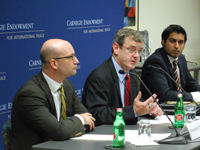Registration
You will receive an email confirming your registration.
IMGXYZ2732IMGZYXCatastrophic flooding in Pakistan this summer threatens to undermine counterinsurgency efforts as the military turns its focus to relief and recovery missions. Recently back from Pakistan, Haider Mullick, a Fellow at the Joint Special Operations University, provided a firsthand account of the security situation in the flood's aftermath, based on briefings with senior military officers and disaster relief organizations. He also assessed the impact of the floods on counterterrorism operations in the north and militant group activity in the south. John Gill from the National Defense University's Near East–South Asia Center gave commentary on the discussion. Carnegie’s Stephen Tankel moderated.
Scale of the Disaster
Mullick noted that the scale of the tragedy was unprecedented, and that Pakistan’s response to the floods revealed critical inadequacies in Pakistan’s preparedness. With 7 million people homeless and one-fifth of the country having been underwater, parts of the country have essentially been destroyed.
- Economic Impact: Gill noted that prior to this catastrophe, Pakistan was already in trouble economically. The impact of this disaster is not only being felt in the destruction of villages and houses, but also in the long-term need to re-establish agriculture in the area.
- The Pakistani Military: The military is the only Pakistani institution trained or equipped to handle disaster relief and hence has been the primary Pakistani institution active in the relief efforts. Civilian institutions have proven inadequate, and Mullick was told that politicians rarely make appearances in the flooded regions. These additional duties have overstretched the Pakistani military.
Security
- Overstretched Military: The Pakistani military has not only been diverted from fighting militants and insurgents, but its facilities have also been damaged by the flooding, Gill observed. The need to provide both security and aid has placed an enormous burden on the military. He predicted further difficulties when reconstruction aid is transferred from the military to civilian control.
- Terrorism: During Mullick’s visit to Pakistan, seven terrorist attacks took place, he reported. The floods have provided an opening for extremist groups to flourish by distracting and occupying the military, providing ample opportunities for terrorist strikes, and offering Islamist groups an opportunity to win the hearts and minds of the people through limited but high-impact humanitarian relief.
- Al-Qaeda: Al-Qaeda’s strength is not in numbers, Mullick argued, but rather in its ability to leverage and work through the various militant outfits in Pakistan as well as to subcontract the services of former army and ISI officers.
- Lashkar-e-Taiba: Elements from or associated with Lashkar-e-Taiba (LeT) have been primary recipients of al-Qaeda’s money and attention, Mullick said. It is currently not on the ISI’s list of terrorist organizations, in spite of the threat it poses to Pakistanis.
International Response
- U.S. Response: The floods provide a window of opportunity for the United States to improve its relationship with both the Pakistani government and people, Mullick stated. However, that window is quickly closing. Groups such as USAID have done a good job of providing aid, but the United States has failed to leverage this aid to improve the American image.
- Media Coverage: The lack of U.S. media coverage of the floods has been an enormous problem, because American reporters do not realize that the next 9/11 will probably come from Pakistan, Mullick said.
- Donor Fatigue: Gill noted that donor fatigue has limited U.S. support for Pakistan. Ultimately, the extensive nature of the catastrophe has made it difficult for the donor community to efficiently and effectively provide aid. This weak response will prove even more damaging to Pakistan’s humanitarian and security prospects in the long term.
